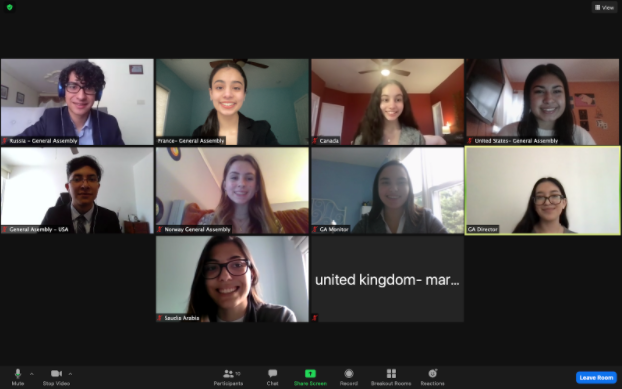Model UN Brings Nations Together From Home
Our bloc and chairs (directors) From Left to Right: First row: Oscar Inaki Rodriguez Dias, Tara Lauther, Teresa Lauther, Priscila Putzulu Second Row: Gerardo Alejandro Alarcon Figueroa, Saorla Scully, Alexia Kallmes, Belen Garcia Third Row: Stephania Moinhos Garcia
March 16, 2021
Model United Nations is an opportunity for students to represent the values and interests of a country different than their own. Modeled after the United Nations (hence the name) students act as delegates to represent a country in resolving a situation. From February 26 to 28, I represented France in World Leadership MUN with seniors Priscila Putzulu (representing The United States), Saorla Scully (representing Norway), and Teresa Lauther (representing Canada). This was my sixth MUN conference. We were the only delegates from the United States: other delegates came from all over Latin America. We were invited by my friend Diego Aguirre Villegas, founder of WLMUN. After a 20-hour-long weekend of MUN, my dreams were filled with debates and parli pro.
In the General Assembly, delegates debated two topics: economic sanctions on developing countries and efforts to stop racism and xenophobia. The goal of the General Assembly is to find solutions to the discussed topics that countries can adopt and implement. Delegates form blocs, or a team of countries, to create working papers and vote on them to form resolution papers.
Our second topic, racism and xenophobia, is prevalent in all areas of the world. Such discrimination undermines the opportunities and liberties of marginalized groups. Our bloc encouraged the implementation of Anti-Discrimination legislation. We suggested that countries begin collecting data on hate crimes based on victim reports, like France does, to better understand the measures that need to be taken. Our bloc wrote an extensive education plan to promote tolerance among school age individuals, and to give marginalized groups more equal access to education. The United States proposed psychological support for minorities and refugees through the creation of national helplines for victims of discrimination dealing with trauma and mental struggles.
Outside of the debates, delegates had the opportunity to speak with students from different countries. We spoke about how different our schools are and related to the challenge of AP classes. The delegates from Mexico told us about how it was common for people to have two first names and sometimes two last names. Saorla Scully loved “being able to learn new things about so many different countries, and meeting people with all different backgrounds and cultures”. Teresa Lauther agrees that it was exciting to relate to other teenagers from so far away: “I was surprised by the little things we had in common. One of the delegates and I both enjoyed Twilight, Disney, and Harry Potter.”
When asked about the most impactful part of the weekend, Priscila Putzulu reflected, “The most impactful part of the conference was the last day when everyone was no longer a country but a person. It was so nice to meet new people and have genuine, raw conversations. You were able to get to know people on such a deep level after hours of debating. Despite the conference being virtual, it was the closest I’ve felt to people in a long time.”
Still, the conference was not without its challenges. We spent many hours before the conference researching our country’s position on the topics at hand to prepare for debate. Saorla Scully commented that in debates, the greatest challenge was “trying to overcome nerves in the beginning and building up confidence”.
In MUN, you do not represent yourself, you represent the country. As a delegate, you stand by the values of that country and push for what that country would want. Teresa Lauther stated that she enjoyed representing Canada and, “I was easily able to align with its values as well as research the foundation of those values.” Lauther strongly supported the breaking of racial barriers in real estate, as does Canada, and pushed for it in the working paper.
On the flip side, it can be hard to fight for the values or policies of a country because it may not always be what you would personally choose. Where we do not have to align with the racist or discriminatory nature of a country, it may be reflected in policies that are supported by the country. Putzulu said,“Despite being an American, it was difficult representing the United States because I couldn’t always defend it. Trying to defend the United States often forced me to compromise my true beliefs in order to serve my purpose as a delegate. It was hard to align myself with all the controversial values of the United States, especially in cases of immigration and the cages. There were moments where I had to remind myself I’m not expressing my opinion, but trying to put forth the best version of America that I could.”

